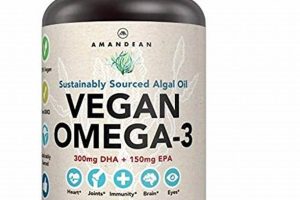A dietary supplement formulated without animal-derived ingredients to provide essential vitamins and minerals is critical for individuals adhering to a plant-based diet. These supplements often contain nutrients like vitamin B12, iron, vitamin D, and omega-3 fatty acids, which can be challenging to obtain adequately from plant sources alone. For instance, a product labeled as suitable for those following a completely plant-based lifestyle will typically exclude ingredients such as gelatin, lanolin, or vitamin D3 derived from animal sources.
Maintaining optimal health on a restrictive eating plan requires careful attention to nutrient intake. This supplementation helps bridge potential nutritional gaps, supporting energy levels, immune function, and overall well-being. Historically, reliance on animal products for certain vitamins and minerals made plant-based diets difficult to sustain; these supplements have mitigated those challenges, enabling more individuals to adopt and maintain a vegan lifestyle with greater confidence in their nutritional adequacy.
The subsequent sections will examine the specific components often found in such supplements, explore the rationale behind their inclusion, discuss considerations for selecting an appropriate product, and provide information on potential interactions and contraindications.
Considerations for Effective Supplementation
Effective utilization of nutritional support requires informed decision-making and consistent implementation. The following recommendations are intended to guide individuals in optimizing their supplementary regimen.
Tip 1: Assess Individual Needs: Nutritional requirements vary based on age, sex, activity level, and underlying health conditions. Consulting a healthcare professional or registered dietitian to determine specific deficiencies is paramount before initiating supplementation.
Tip 2: Verify Ingredient Sourcing: Scrutinize the ingredient list to confirm the absence of animal-derived components. Look for certifications from reputable vegan organizations to ensure product authenticity.
Tip 3: Prioritize Bioavailability: Some forms of vitamins and minerals are more readily absorbed by the body than others. Opt for products containing bioavailable forms, such as methylcobalamin (B12) or vitamin D3 derived from lichen.
Tip 4: Monitor Dosage: Adhere strictly to the recommended dosage on the product label, unless otherwise advised by a healthcare provider. Excessive intake of certain nutrients can lead to adverse effects.
Tip 5: Evaluate Third-Party Testing: Select products that have undergone third-party testing for purity and potency. This ensures that the product contains the listed ingredients in the stated amounts and is free from contaminants.
Tip 6: Consider Timing of Intake: Certain nutrients are best absorbed when taken with food. For example, fat-soluble vitamins (A, D, E, K) are better absorbed when consumed with a meal containing healthy fats.
Tip 7: Be Aware of Potential Interactions: Some vitamins and minerals can interact with medications or other supplements. Disclose all supplements being taken to a healthcare professional to identify potential interactions.
Tip 8: Maintain Regular Monitoring: Periodic blood tests can help assess the effectiveness of the supplementation regimen and identify any emerging deficiencies or excesses. Consult with a healthcare provider regarding appropriate testing intervals.
By implementing these guidelines, individuals can maximize the benefits of vitamin and mineral support while minimizing potential risks. Consistent and informed application of these principles is critical for achieving optimal nutritional status.
The subsequent sections will delve into specific considerations for long-term usage and the importance of integrating supplements as part of a comprehensive approach to health and wellness.
1. Nutrient Deficiencies
Nutrient deficiencies represent a critical concern for individuals adhering to a plant-based diet. This is due to the reduced bioavailability or absence of certain vitamins and minerals in plant-derived foods. The purpose of a supplemental formulation is to address these potential gaps and ensure adequate intake of essential nutrients.
- Vitamin B12 Deficiency
Vitamin B12, primarily found in animal products, is crucial for neurological function and red blood cell production. Plant-based diets typically lack bioavailable B12, necessitating supplementation. Deficiency can lead to irreversible nerve damage and anemia. A supplemental formulation addresses this risk by providing a reliable source of this vitamin.
- Iron Deficiency
While iron is present in plant-based foods, it is primarily in the non-heme form, which is less readily absorbed than heme iron from animal sources. This lower bioavailability can increase the risk of iron deficiency anemia, characterized by fatigue and impaired cognitive function. A supplemental formulation often includes iron, typically in a more bioavailable form, to mitigate this risk.
- Vitamin D Deficiency
Vitamin D, essential for calcium absorption and bone health, is primarily obtained from sun exposure and animal-derived foods. Plant-based diets often lack sufficient vitamin D, particularly in regions with limited sunlight. Deficiency can lead to weakened bones and increased risk of fractures. Supplementation with vegan-friendly vitamin D2 or D3 (derived from lichen) helps maintain adequate vitamin D levels.
- Omega-3 Fatty Acid Deficiency
Omega-3 fatty acids, particularly EPA and DHA, are vital for brain health and cardiovascular function. While ALA, a precursor to EPA and DHA, is found in plant-based sources, its conversion to EPA and DHA is often inefficient. Deficiency can lead to cognitive impairment and increased risk of cardiovascular disease. A supplemental formulation containing algae-derived EPA and DHA provides a direct source of these essential fatty acids.
The addressed deficiencies underscore the importance of strategic supplementation for those following a plant-based eating plan. Addressing these potential deficits with a comprehensive product supports long-term health and well-being, bridging nutritional gaps inherent in restrictive dietary patterns.
2. Ingredient Sourcing
Ingredient sourcing is a critical determinant of the suitability and ethical compliance of any product marketed as a “vegan multivitamin.” The foundational principle of veganism, the exclusion of all animal-derived ingredients, mandates a rigorous evaluation of the origin of each component. Failure to ensure this can render a product falsely advertised and unacceptable to its target consumer base. For instance, a multivitamin containing vitamin D3 sourced from lanolin, a substance derived from sheep’s wool, would contravene the ethical guidelines of veganism, despite potentially providing other essential nutrients. The reliance on transparent and verifiable supply chains is, therefore, paramount.
The importance of ingredient sourcing extends beyond simple adherence to ethical principles. It also encompasses considerations of sustainability and environmental impact. Sourcing nutrients from environmentally responsible suppliers ensures that the production of the multivitamin does not contribute to deforestation, habitat destruction, or the exploitation of animal populations. Examples include obtaining algae-derived omega-3 fatty acids from sustainably managed aquaculture operations or utilizing plant-based capsules instead of gelatin-based capsules. Consequently, the credibility and market acceptance of a “vegan multivitamin” are intrinsically linked to the integrity of its sourcing practices.
In summary, ingredient sourcing constitutes a cornerstone of the “vegan multivitamin” concept. It is not merely a checklist item but a fundamental requirement for product authenticity and ethical integrity. Challenges persist in verifying complex supply chains and ensuring consistent standards across different suppliers. However, transparency, traceability, and commitment to sustainable practices are essential for maintaining consumer trust and promoting the responsible production of these nutritional supplements.
3. Bioavailability
Bioavailability is a pivotal factor determining the effectiveness of any “vegan multivitamin.” It refers to the proportion of a nutrient that is absorbed from the supplement and becomes available for use in the body. The inherent nature of plant-based sources and the processing methods employed in supplement manufacturing can significantly impact the bioavailability of essential vitamins and minerals.
- Chelated Minerals
Chelation involves binding minerals to amino acids, organic acids, or other molecules to enhance their absorption. Minerals like iron, zinc, and magnesium are often chelated in supplements to improve bioavailability. For instance, iron bisglycinate is a chelated form of iron that exhibits superior absorption compared to ferrous sulfate, a non-chelated form commonly used in conventional supplements. This is particularly relevant for individuals following plant-based diets, as plant-derived iron is typically less bioavailable than heme iron from animal sources.
- Vitamin Forms
The chemical form of a vitamin significantly influences its bioavailability. For example, methylcobalamin is a more readily absorbed form of vitamin B12 compared to cyanocobalamin. Similarly, vitamin D3 derived from lichen is considered more bioavailable than vitamin D2 for raising and maintaining vitamin D levels in the body. Selecting a “vegan multivitamin” with bioavailable vitamin forms ensures optimal utilization of these essential nutrients.
- Enhancers and Inhibitors
The co-ingestion of certain substances can either enhance or inhibit the absorption of vitamins and minerals. For example, vitamin C enhances the absorption of non-heme iron, while phytates found in grains and legumes can inhibit the absorption of certain minerals like zinc and calcium. Formulations containing a combination of nutrients should consider these interactions to optimize bioavailability. Some “vegan multivitamins” incorporate bioavailability enhancers to counteract the effects of inhibitors.
- Lipid Solubility
The solubility of certain vitamins influences their absorption and utilization. Fat-soluble vitamins, such as vitamins A, D, E, and K, require the presence of dietary fats for optimal absorption. Taking a “vegan multivitamin” containing these vitamins with a meal that includes healthy fats, such as avocados or nuts, can improve their bioavailability. Similarly, the use of encapsulation technologies that enhance lipid solubility can further increase the absorption of fat-soluble vitamins.
Optimizing bioavailability is essential for maximizing the benefits derived from a “vegan multivitamin.” Choosing supplements with chelated minerals, bioavailable vitamin forms, and carefully considering potential enhancers and inhibitors of absorption ensures that the body can effectively utilize the nutrients provided. Careful attention to lipid solubility and the timing of supplement intake further contributes to improved bioavailability and overall nutritional status.
4. Dosage Control
Dosage control is a critical aspect of utilizing supplemental products. In the context of plant-based dietary supplements, meticulous adherence to recommended serving sizes and upper limits is paramount to ensure efficacy without inducing adverse effects.
- Vitamin Toxicity
Fat-soluble vitamins (A, D, E, and K) accumulate in bodily tissues, and excessive intake can lead to hypervitaminosis and associated toxicities. Vitamin A toxicity can manifest as liver damage, bone pain, and increased intracranial pressure. Vitamin D toxicity can cause hypercalcemia, leading to kidney damage and cardiovascular complications. Therefore, strict adherence to the recommended dosage of such vitamins in a vegan supplement is essential.
- Mineral Overload
Excessive intake of certain minerals can disrupt mineral balance and induce adverse effects. Iron overload, particularly in individuals without iron deficiency, can lead to hemochromatosis and organ damage. High doses of zinc can interfere with copper absorption, potentially leading to copper deficiency and associated hematological abnormalities. Meticulous dosage control prevents these adverse consequences.
- Interactions with Medications
High doses of certain vitamins and minerals can interact with prescription medications, altering their efficacy or increasing the risk of side effects. For example, vitamin K can interfere with the anticoagulant effects of warfarin. High doses of vitamin E can increase the risk of bleeding in individuals taking antiplatelet medications. Awareness of potential interactions and adherence to appropriate dosages is critical to avoid adverse outcomes.
- Individual Variability
Individual factors, such as age, sex, body weight, and underlying health conditions, influence nutrient requirements and tolerance levels. What constitutes an appropriate dosage for one individual may be excessive or insufficient for another. Therefore, personalized dosage adjustments based on individual needs and health status, in consultation with a healthcare provider, may be necessary to optimize the benefits of a product.
These facets highlight the significance of stringent dosage control in the utilization of vegan multivitamin supplements. Compliance with recommended serving sizes, awareness of potential toxicities and interactions, and consideration of individual variability are essential components of a responsible and effective supplementation regimen.
5. Third-Party Testing
Third-party testing constitutes an independent evaluation of a product’s composition and quality. In the context of plant-based multivitamins, this testing verifies label claims regarding ingredient identity and quantity. The absence of animal-derived components, a defining characteristic, is confirmed through these analyses. Furthermore, third-party testing assesses the presence of contaminants, such as heavy metals or pesticides, ensuring product safety. The direct effect of this testing is enhanced consumer confidence and reduced risk of consuming substandard or adulterated supplements. For instance, certifications like USP, NSF International, or Informed-Sport indicate that a product has undergone rigorous evaluation and meets established quality standards. Without such verification, the purported health benefits and ethical claims of a product lack substantiation.
The practical significance of third-party testing extends to mitigating potential adverse health outcomes. Inaccurate labeling or the presence of undisclosed ingredients can lead to allergic reactions or interactions with medications. Third-party verification reduces this risk by providing objective, scientifically sound data on a product’s composition. Moreover, it addresses concerns about the bioavailability of nutrients. Some testing protocols assess nutrient dissolution rates, ensuring that the vitamins and minerals are released and available for absorption in the digestive system. This information is crucial for individuals relying on a plant-based multivitamin to meet their nutritional needs.
In conclusion, third-party testing serves as a critical quality control mechanism for products. It bridges the gap between manufacturer claims and verifiable data, ensuring ethical sourcing, ingredient purity, and accurate labeling. While not a legal requirement in all jurisdictions, it represents a commitment to transparency and consumer safety. Challenges remain in harmonizing testing standards and ensuring accessibility of testing data to consumers. Nevertheless, it remains an essential tool for evaluating the quality and reliability of plant-based multivitamins, contributing to a more informed and safer marketplace.
6. Long-Term Use
The extended consumption of dietary supplements necessitates careful consideration due to potential cumulative effects and evolving nutritional needs. Plant-based multivitamins, designed to address specific deficiencies associated with vegan diets, are no exception. Understanding the implications of protracted use is crucial for maintaining optimal health and avoiding unintended consequences.
- Nutrient Accumulation
The chronic intake of certain vitamins and minerals can lead to accumulation in the body, potentially resulting in toxicity. Fat-soluble vitamins (A, D, E, and K) are particularly prone to accumulation. For example, excessive vitamin A intake over several years can cause liver damage and bone abnormalities. Therefore, periodic monitoring of blood levels may be warranted to prevent hypervitaminosis. Similarly, mineral overload, such as iron, can occur with long-term, high-dose supplementation, increasing the risk of hemochromatosis.
- Alteration of Gut Microbiome
Prolonged use of certain supplements, particularly those containing prebiotics or high doses of certain minerals, can alter the composition and function of the gut microbiome. This alteration can have both beneficial and adverse effects, influencing immune function, nutrient absorption, and overall gastrointestinal health. Careful selection of supplements and consideration of their potential impact on the microbiome is essential.
- Adaptation of Endogenous Production
Long-term supplementation with certain nutrients may influence the body’s capacity to produce those nutrients endogenously. For example, prolonged use of supplemental vitamin D may reduce the body’s ability to synthesize vitamin D from sunlight exposure. This adaptation can create dependence on supplementation, making it crucial to gradually taper off dosages under the guidance of a healthcare professional if supplementation is discontinued.
- Changes in Nutritional Needs
Nutritional needs evolve throughout the lifespan due to factors such as aging, changes in physical activity, and the development of chronic health conditions. Long-term supplement regimens should be periodically reassessed to ensure they continue to meet evolving needs. For example, older adults may require higher doses of vitamin B12 to compensate for reduced absorption. Additionally, changes in medication usage or the development of new health conditions may necessitate adjustments to the supplement regimen to avoid interactions or address new deficiencies.
These considerations emphasize the importance of ongoing assessment and adjustments in supplementation strategies. Extended use requires periodic evaluation of nutrient status, potential interactions, and evolving individual needs. Regular consultation with healthcare providers allows personalized adjustments to supplement regimens, supporting well-being and mitigating potential risks associated with long-term intake.
Frequently Asked Questions About Vegan Multivitamin Formulations
The following questions address common concerns and misconceptions regarding nutritional support designed for plant-based eating plans.
Question 1: Are vitamin support products truly necessary for individuals adhering to a plant-based diet?
While a well-planned plant-based diet can provide many essential nutrients, certain vitamins and minerals, such as vitamin B12, vitamin D, and omega-3 fatty acids (EPA and DHA), are either absent or less bioavailable in plant-derived foods. Supplementation helps bridge these nutritional gaps, ensuring adequate intake of these critical nutrients.
Question 2: What constitutes an “animal-derived” ingredient in the context of these formulations?
Animal-derived ingredients include any substance obtained from animals or animal byproducts. Common examples include gelatin (derived from collagen), lanolin (derived from sheep’s wool), vitamin D3 (often derived from lanolin), and certain forms of omega-3 fatty acids (derived from fish oil). Truly products should exclude all such components.
Question 3: How can ingredient sourcing authenticity be verified?
Authenticity verification relies on transparent supply chains and certifications from reputable vegan organizations, such as The Vegan Society or Vegan Action. These certifications indicate that the product has undergone independent assessment to ensure the absence of animal-derived ingredients. Additionally, scrutinizing the ingredient list and contacting the manufacturer for detailed sourcing information can provide further assurance.
Question 4: Does the form of vitamin impact its effectiveness?
The chemical form of a vitamin can significantly influence its bioavailability, or the extent to which it is absorbed and utilized by the body. For example, methylcobalamin is a more readily absorbed form of vitamin B12 compared to cyanocobalamin. Similarly, chelated minerals, such as iron bisglycinate, exhibit superior absorption compared to non-chelated forms. Choosing supplements with bioavailable forms enhances their effectiveness.
Question 5: What potential risks are associated with exceeding recommended dosages?
Exceeding recommended dosages of vitamins and minerals can lead to hypervitaminosis and mineral toxicity. Fat-soluble vitamins (A, D, E, and K) are particularly prone to accumulation and can cause adverse effects at high doses. Mineral overload, such as iron, can also be harmful. Adhering to recommended dosages and consulting with a healthcare provider regarding individual needs minimizes these risks.
Question 6: How does third-party testing enhance product reliability?
Third-party testing provides an independent assessment of a product’s composition and quality. It verifies label claims regarding ingredient identity and quantity, confirms the absence of contaminants, and may assess nutrient dissolution rates. Certifications from reputable organizations indicate that the product has undergone rigorous evaluation and meets established standards, enhancing consumer confidence.
These FAQs illustrate some key aspects of supplemental products aimed at plant-based diets, which underscore the importance of informed decision-making and responsible usage.
The succeeding article section will explore specific considerations for selecting an appropriate dietary supplement, providing a guide for choosing a high-quality and effective product.
Vegan Multivitamin
This exploration has delineated the multifaceted nature of the “vegan multivitamin.” It has underscored the critical importance of such formulations in addressing potential nutrient deficiencies inherent in plant-based diets. Topics explored include ingredient sourcing, bioavailability, dosage control, and the necessity of third-party testing to ensure product safety and efficacy. The long-term implications of consistent consumption have been presented, emphasizing the need for periodic assessment and personalized adjustments to supplementation regimens.
The informed selection and responsible utilization of a “vegan multivitamin” represents a proactive approach to supporting long-term health and well-being. Continued research and heightened awareness regarding nutrient needs will undoubtedly refine these supplements, further enhancing their effectiveness and accessibility. Prioritizing evidence-based practices and transparent information will contribute to a more nutritionally sound future for individuals embracing plant-based lifestyles.







